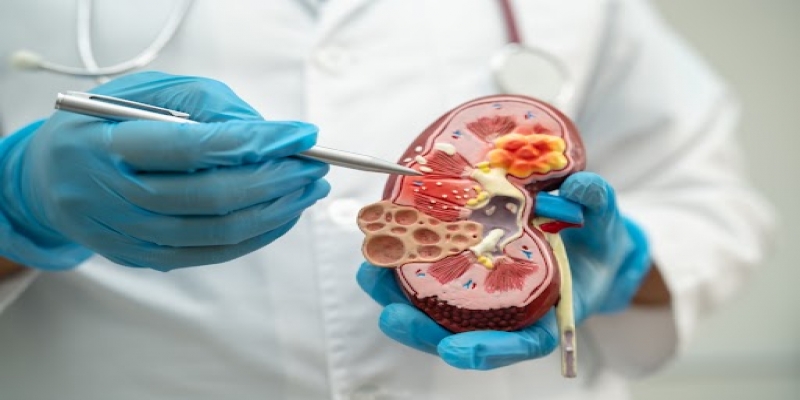Understanding the Causes of Kidney Stones and Effective Treatment Methods
2024-04-17 / RG STONE HOSPITAL / Urinary / Kidney Stone

Introduction: Kidney stones are a common ailment affecting millions of individuals worldwide. These small, hard deposits form in the kidneys and can cause intense pain when they pass through the urinary tract. Understanding the underlying causes of kidney stones, particularly in men, is crucial for prevention and effective treatment.
What Causes Kidney Stones? Kidney stones can develop due to various factors, including:
-
Dietary Factors: Consuming foods high in oxalate, sodium, or protein can contribute to kidney stone formation. Oxalate-rich foods like spinach, nuts, and chocolate can increase oxalate levels in the urine, promoting stone formation. Similarly, excessive sodium intake can lead to increased calcium excretion, which may form calcium-based stones.
-
Dehydration: Inadequate fluid intake reduces urine volume, leading to concentrated urine. Concentrated urine is more likely to facilitate the crystallization of minerals, such as calcium and uric acid, which are primary components of kidney stones.
-
Medical Conditions: Certain medical conditions, such as hyperparathyroidism, gout, and urinary tract infections (UTIs), can increase the risk of kidney stone formation. These conditions alter urine composition or flow, promoting the development of stones.
-
Genetic Factors: A family history of kidney stones can predispose individuals to develop them. Genetic factors may influence the metabolism of minerals involved in stone formation, making some people more susceptible.
-
Lifestyle Factors: Sedentary lifestyle habits and obesity are associated with an increased risk of kidney stones. Physical inactivity and excess weight can disrupt metabolic processes and increase urinary excretion of stone-forming substances.
What Causes Kidney Stones in Men? While the general causes of kidney stones apply to both men and women, several factors contribute specifically to kidney stone formation in men:
-
Higher Protein Intake: Men typically consume more protein than women, which can increase uric acid excretion and contribute to uric acid stone formation.
-
Increased Risk of Gout: Gout, a type of arthritis caused by the accumulation of uric acid crystals in the joints, is more prevalent in men. Elevated uric acid levels associated with gout can also lead to the formation of uric acid kidney stones.
-
Occupational Factors: Certain occupations, such as those involving prolonged physical exertion or exposure to high temperatures, may increase the risk of kidney stone formation in men. Dehydration due to sweating and inadequate fluid intake can promote stone formation.
-
Higher Alcohol Consumption: Men tend to consume more alcohol than women, and excessive alcohol intake can lead to dehydration and increase the risk of uric acid stone formation.
Treatment Options for Kidney Stones:
The management of kidney stones involves various approaches aimed at alleviating symptoms, preventing recurrence, and facilitating the passage of stones. Treatment options include:
-
Pain Management: Severe pain associated with kidney stones is often managed with analgesic medications, such as nonsteroidal anti-inflammatory drugs (NSAIDs) or opioids.
-
Hydration: Adequate fluid intake is crucial for preventing the recurrence of kidney stones. Increasing water consumption helps dilute urine and reduce the concentration of stone-forming substances.
-
Medication: Depending on the type of kidney stone, medications may be prescribed to prevent stone formation or facilitate their passage. These may include diuretics, alkalinizing agents, or medications to inhibit the production of stone-forming substances.
-
Extracorporeal Shock Wave Lithotripsy (ESWL): ESWL is a non-invasive procedure that uses shock waves to break large kidney stones into smaller fragments, making them easier to pass through the urinary tract.
-
Surgical Intervention: In cases where kidney stones are too large to pass naturally or cause complications such as urinary obstruction, surgical procedures such as ureteroscopy or percutaneous nephrolithotomy (PCNL) may be necessary to remove the stones.
Conclusion: Kidney stones pose a significant health concern, particularly for men, who may be at higher risk due to various factors such as dietary habits, lifestyle choices, and genetic predisposition. Understanding the causes of kidney stones is essential for implementing preventive measures and effective treatment strategies. By adopting a balanced diet, staying hydrated, and seeking appropriate medical care, individuals can reduce their risk of kidney stone formation and improve their overall urinary tract health.
Categories
Hernia Repair
Appendicitis
Piles
Urological Treatment
Hernia treatment
Enlarged Prostate (BPH)
Gall Bladder Stone
Urinary / Kidney Stone
Vitamins
Indian Health Care System
Exercise
Obesity
Female Urinary Incontinence
Single Incision Laparoscopic Surgery (SILS)
Kidney Cancer
Bladder Cancer
Ovarian cancer
Nephrology
Bariatric Surgery
Kidney Function Test
Female Urology
Radiation Therapy
Alcoholic Fatty Liver
Liver disease
Gastroenterology
Kidney Disease
Nutrition & Health
Lung Cancer

